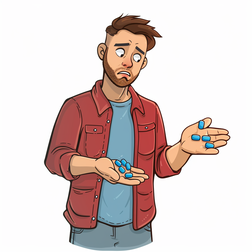Do hydroceles cause erectile dysfunction?
- Hydroceles and Erectile Dysfunction: Understanding the Connection
- Misconceptions About Hydroceles Causing Erectile Dysfunction
- Psychological Factors: The Role of Stress and Anxiety in Erectile Dysfunction
- Understanding Erectile Dysfunction (ED) as a Separate Medical Condition
- Importance of Differentiating Between Hydroceles and Erectile Dysfunction
- Seeking Treatment for Hydroceles and Erectile Dysfunction

Hydroceles and Erectile Dysfunction: Understanding the Connection
Hydroceles are fluid-filled sacs surrounding the testicle that often present as painless masses. Despite their benign nature, there is no direct evidence that hydroceles cause erectile dysfunction (ED). However, various concerns arise due to the psychological impact and mechanical effects of an enlarged scrotum.
Misconceptions About Hydroceles Causing Erectile Dysfunction
It is a common misconception that hydroceles cause erectile dysfunction directly. Medical evidence consistently shows that hydroceles do not directly lead to ED or infertility. These fluid-filled sacs are generally harmless and do not interfere with the physiological mechanisms responsible for erection or fertility.
Psychological Factors: The Role of Stress and Anxiety in Erectile Dysfunction
Stress or anxiety related to the appearance or discomfort of a hydrocele can indirectly contribute to erectile difficulties. These psychological effects are temporary and primarily concern the individual's perception and emotional response to their condition, rather than a physical inability to perform sexually.
Understanding Erectile Dysfunction (ED) as a Separate Medical Condition
Erectile dysfunction is characterized by the inability to achieve or maintain an erection sufficient for satisfactory sexual intercourse. It is essential to recognize that ED has various causes, including psychological issues, vascular problems, and hormonal imbalances, which are unrelated to the presence of a hydrocele.
Importance of Differentiating Between Hydroceles and Erectile Dysfunction
Although some reports suggest hydroceles may contribute to sexual dysfunction, particularly in cases of unusually large hydroceles that might impose a mechanical barrier during intercourse, these are exceptional circumstances.
The typical hydrocele does not affect sexual function or fertility.
Seeking Treatment for Hydroceles and Erectile Dysfunction
For individuals experiencing discomfort or concern about their hydrocele, it is crucial to consult a healthcare provider. Treatment can alleviate symptoms and address any psychological impact. Similarly, men facing erectile difficulties should seek a medical evaluation to determine the underlying cause and receive appropriate treatment, ensuring that these issues are addressed independently to improve quality of life and sexual health.



